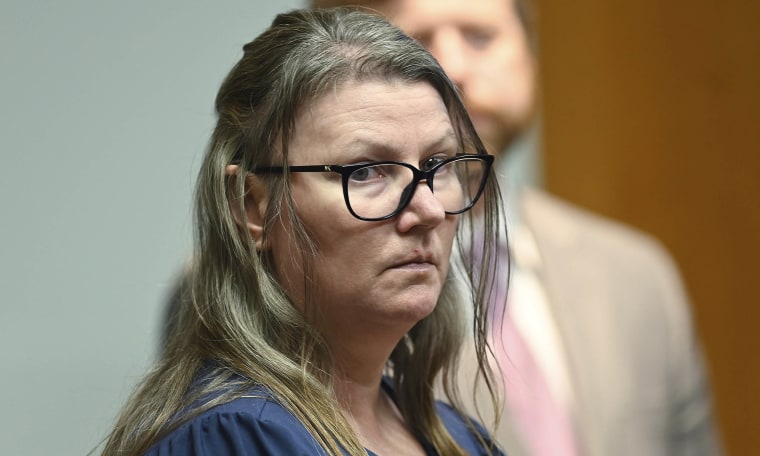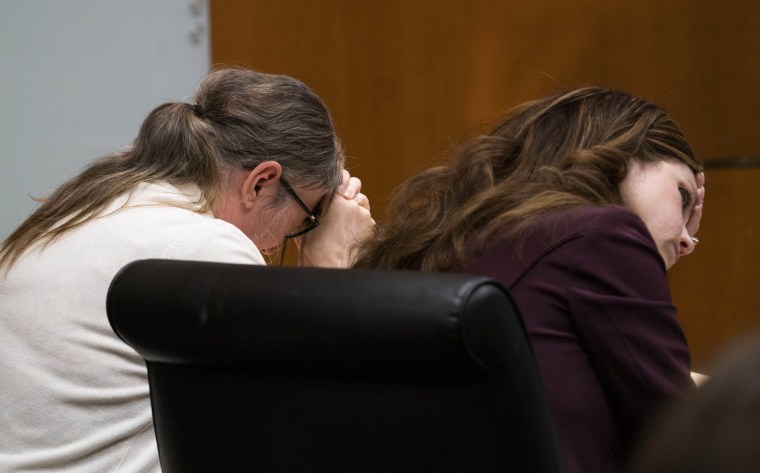The mother of a Michigan boy who killed four students in a shooting rampage at a high school in 2021 testified in her own defense Thursday that she had no idea her son was planning the attack and wished he had "killed us instead."
Jennifer Crumbley took the stand on Feb. 1 to testify in her own defense during her involuntary manslaughter trial, where she has pleaded not guilty to the charges.
Throughout an emotional day of testimony, Crumbley, 45 said she could not have stopped her son, Ethan Crumbley, who killed four people and injured seven others at Oxford High School on Nov. 30, 2021.
"As a parent, you spend your whole life trying to protect your child from other dangers," she said. "You never would think you have to protect your child from harming somebody else."

Ethan Crumbley was sentenced to life in prison without parole last year for killing four of his fellow students at Oxford High School in Michigan in 2021. His parents, James and Jennifer Crumbley, are being tried separately on involuntary manslaughter charges. His mother's trial began late last month.
Jennifer Crumbley told jurors she did not dismiss clear warning signs about her son leading up to the shooting. She described him as quiet and having few friends, but said she never thought he was a danger to others.
"I felt like I had an open door," she said. "He can come to me about anything."

She added: "I wish he would’ve killed us instead."
Crumbley also testified her husband was the one responsible for storing the gun, adding that she didn't feel comfortable with "being in charge of that."
Jurors also heard from Ethan Crumbley's high school counselor, Shawn Hopkins. He testified on Jan. 28 that he supported the idea of keeping the boy at school when the family met with school officials on the day of the attack.
"I felt it was better for him to be around peers and people his age, than to be home alone," Hopkins said.
Crumbley added her family has "lost everything" since the shooting.
"I do not want to disrespect those families that truly are the victims on this, but we did lose a lot," she said.
The cases against Jennifer and James Crumbley are the first of their kind
NBC News senior legal correspondent and Saturday TODAY co-anchor and Laura Jarrett tells TODAY.com James and Jennifer Crumbley’s cases are the first of their kind in connection with a school shooting in the U.S. — as it is extremely rare for a parent to be charged for the conduct of a teenager.
In two recent cases — the deadly shooting at a July 4 parade in Highland Park, Illinois, in 2022 and a chilling incident in Virginia where a 6-year-old boy shot his teacher last year — parents were charged in connection to their children's crimes and given jail time. Neither parent was charged with manslaughter.
"This is a first, prosecutors would say, not because the law changed," Jarrett says. "It's because the facts are so egregious, that the facts called out to apply the law in a way that had never been used before."
Parents have never been charged in a school shooting before. Why now?
Ethan Crumbley, then 15, killed four students and injured seven others at Oxford High School on Nov. 30, 2021.
On Dec. 3, 2021, prosecutors announced James and Jennifer Crumbley were charged with four counts each of involuntary manslaughter, leading to an hourslong manhunt throughout the state of Michigan.
The pair were arrested on Dec. 4, 2021, and they both pleaded not guilty to the charges.
Oakland County Prosecutor Karen McDonald told MSNBC on Dec. 3, 2021, that the teen’s parents "had reason to believe he was dangerous" and that she believed "they should be held accountable."
Jarrett says the prosecution has acknowledged they have an uphill battle in the case "given the fact that this is the first time the law has been applied in this way."
"But (prosecutors) would say that the parents ignored signs and were negligent in alerting the school and authorities to the fact that they had purchased a gun for their son," she says.
Why do James and Jennifer Crumbley have separate trials?
It isn't uncommon for judges in criminal cases that have multiple defendants to order separate trials, Jarrett says.
"A judge can decide to separate the cases and the trials in the hopes that that will promote fairness for the defendants — they have a presumption of innocence until proven guilty," Jarrett says. "It's up to the judge to decide whether to separate them."
Attorneys for both James and Jennifer Crumbley filed motions requesting to separate their trials on Nov. 13, 2021, after receiving new evidence from McDonald, the county prosecutor, according to NBC affiliate WDIV of Detroit.
Oakland County Circuit Court Judge Cheryl Matthews issued two orders granting the motions to separate the cases that same day.
It is unclear why Jennifer Crumbley's trial was scheduled first, Jarrett says. Jury selection in Jennifer Crumbley’s trial began on Jan. 23, and James Crumbley's trial is set to begin on March 5.
Jarrett adds that she thinks, in these types of cases, whoever has the second trial has "some benefit."
"It may be the case that after the mom's trial gets sorted away, maybe the dad tries to strike a plea deal, but it also might be the case the prosecutor has refused to do a plea deal with him," Jarrett says.
"Sometimes prosecutors want to (offer a plea deal), even if they think they can get a conviction, because it saves them resources and then it's done and provides some sort of closure for the families," she continues. "But they might not want (to) on this — they're trying to set precedent.
"It's a historic case, it's the first time they've ever done this," she adds. "They might want a straight up conviction, and they might not be willing to engage in a plea with him."
What is the key evidence in the prosecutors' case?
Jarrett says there are two striking pieces of evidence in both cases: text messages between Jennifer Crumbley and her son, and the fact that the parents did not tell the school they had purchased a gun for Ethan as an early Christmas gift — even though they met with school officials on the day of the shooting.
A day before the shooting, school officials alerted James and Jennifer Crumbley that their son was searching for ammunition online, McDonald said during a Dec. 3, 2021, press conference.
The teen's parents allegedly dismissed calls from the school, and Jennifer Crumbley later texted her son: "LOL... I'm not mad at you. You have to learn not to get caught."
Jarrett says, "The perception is going to be she didn't take it seriously — she told him not to get caught instead of being concerned about why is he searching for ammunition."
Another piece of evidence is that James and Jennifer Crumbley were called to the school a few hours before the shooting after school officials found violent images on a math assignment with the message: "The thoughts won’t stop. Help me."
James and Jennifer Crumbley did not inform the school that their son had access to a gun, and they declined to remove him from the school that day, McDonald said during the Dec. 3 press conference.
"Instead of taking him home that day after he was drawing disturbing pictures and crying out for help, they didn't take him out of school that day. They kept him there," Jarrett says. "They went back to work, and that ended up being the day of the attack."
Ethan Crumbley had brought the handgun to school that day, but no one checked his backpack.
The then 15-year-old opened fire just before 1 p.m. and killed four students: Hana St. Juliana, 14; Madisyn Baldwin, 17; Tate Myre, 16; and Justin Shilling, 17. Seven others, including a teacher, were wounded.
What is the defense's strategy?
Defense attorneys for James and Jennifer Crumbley hit a snag on Jan. 22, when Ethan Crumbley's new appellate lawyers signaled in a court filing that they will try to block Ethan from testifying in his parents' cases.
Ethan Crumbley told the judge during his sentencing that school officials and his parents "did not know and I did not tell them what I planned to do, so they are not at fault." But that statement likely cannot be entered into evidence in his parents' trials unless Ethan Crumbley were to testify himself, Jarrett says.
"According to a new court filing, Ethan's new lawyers do not want him to testify at their trials and this complicates the parents' defense," Jarrett says. "Because now they don't have the benefit of the person who actually did the shooting coming in to say, 'Look, they didn't have anything to do with this, it was all my fault.'"
On Feb. 1, Defense attorneys again pushed for Ethan Crumbley to testify during Jennifer Crumbley's trial. But the judge said existing case law prevents them from calling him to the stand because he has made it clear he will plead the fifth.
Jarrett says the defense's main strategy will likely be to argue that being a bad parent isn't a criminal act.
"The only hope is to try to appeal to the jury, to say we could not possibly have predicted he would do something this shocking and horrible," Jarrett says. "They have to try to appeal to the parents on the jury to say, 'Every time your kid has said something that was like, bonkers, you didn't think that they were going to do something this heinous.'"
Jarrett adds that if the prosecution does get a conviction in the cases of James and Jennifer Crumbley, it could provide a template for other cases in the future.
"You might see more prosecutors be emboldened — depending on the facts and circumstances — to charge parents in the future," she says.
